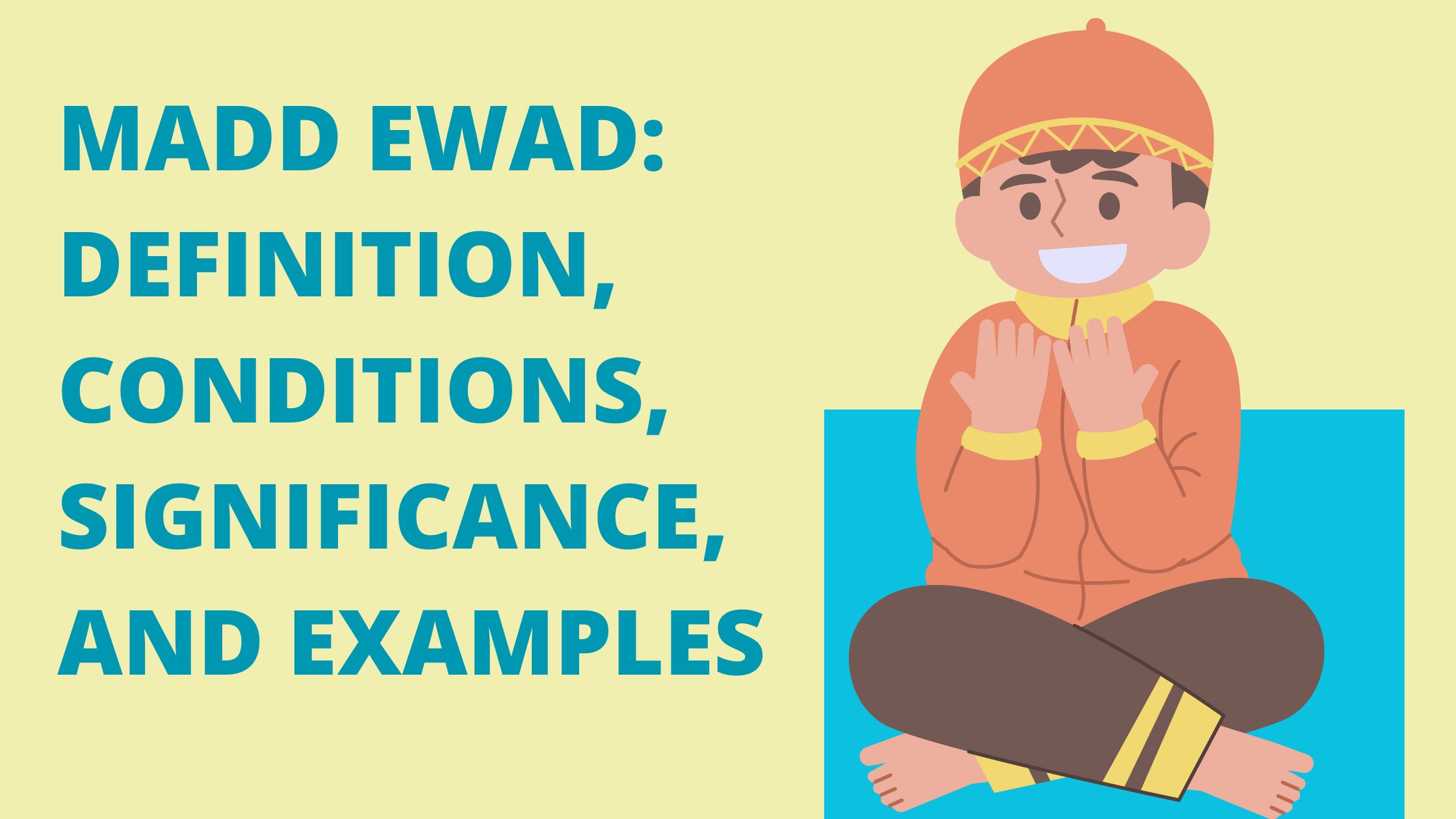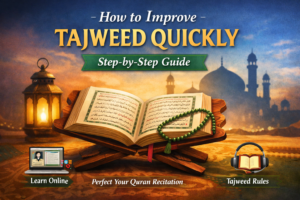In this blog post, we will explore how understanding and implementing Madd Ewad can enhance your recitation, improve your pronunciation, and deepen your spiritual connection.
Are you looking to take your recitation of the Quran to a whole new level? Look no further than the power of Madd Ewad in Tajweed!
This often-overlooked aspect of tajweed can truly elevate your recitation and allow you to connect with the words of Allah like never before. Get ready to unlock the hidden potential within yourself as we delve into the world of Madd Ewad in Tajweed!
Table of Contents
Definition of Madd Ewad
Madd Ewad, also known as Compensation Madd, occurs when encountering a tanween (double short vowel sound) while reciting. Madd Ewad comes into play during this situation.
Explanation of Madd Ewad
Madd Ewad involves compensating for the absence of an actual elongation by pronouncing the tanween as if it were an alif (اْ) stretched for two counts.
When you stop on a word with a tanween, you prolong the sound for a duration equal to two counts.
However, it is important to note that if you continue reading and there is no madd (elongation), the tanween should be pronounced normally without any compensation.
The Significance of Madd Ewad in Quranic Recitation
The significance of Madd Ewad in Quranic recitation can be summarized in the following points:
1. Role in Maintaining Rhythm and Melody:
– Crucial for maintaining the rhythmic flow and melody.
2. Compensating for Elongation Absence:
– Pronouncing tanween as stretched alif for two counts.
3. Ensuring Accurate Pronunciation and Text Integrity:
– Proper application ensures accurate pronunciation and preserves Quranic text integrity.
4. Requirement of Deep Knowledge:
– Understanding demands deep knowledge of Arabic and Tajweed rules.
5. Enhancing Recitation Skills and Precise Meanings:
– Mastery enhances recitation skills and conveys precise meanings of Quranic verses.
6. Maintaining Authenticity and Reverence:
– Helps maintain authenticity and reverence of the Quran as revealed.
7. Beauty, Harmony, and Connection:
– Implementation brings out the beauty and harmony of verses and strengthens the connection with the divine message.
8. Essential Component of Tajweed:
– Madd Ewad is an essential component of Tajweed, governing proper Quranic recitation.
By enrolling in BayanalQuran’s Online Tajweed Course, students will gain a deep understanding of the significance of Madd Ewad.
Conditions for Applying Madd Ewad in Quranic Recitation
The conditions for applying Madd Ewad in Quranic recitation are as follows:
1. Tanween Fat-h Ending Requirement:
– Word must end with tanween fat-h ( اً ), resulting in the alif ( ا ) at the end.
2. Stoppage Indication:
– Reciter stops after the word, reaching the end of an ayah or suitable pause.
3. Prolongation of Alif:
– After stopping, the alif is prolonged for two counts without pronouncing the tanween fat-h.
4. Void if No Stoppage:
– Madd Ewad is not required if there is no pause after the word and recitation continues.
By adhering to these conditions, reciters can ensure the accurate implementation of Madd Ewad, maintaining the proper rhythm and melodic flow of Quranic recitation.
Understanding these conditions is essential for achieving the precise and beautiful recitation of the Quran.
Examples of Madd Ewad in the Quran
There are several examples of Madd Ewad, the compensated prolongation, found throughout the Quran. These examples demonstrate the application of this Tajweed rule in preserving the rhythmic flow and melodiousness of the recitation. Here are a few instances:
First Example
One example of Madd Ewad, the compensated prolongation, can be found in Surah Al-Kahf (18:46) in the Quran. In this verse, the word “ثَوَابًۭا” is encountered, which has a tanween at the end.
When reciting this word and coming to a stop, the tanween is compensated by prolonging the vowel sound. In this case, the tanween is pronounced as “ثوابا” with an elongated vowel sound, as if it were written without the tanween.
Second Example
Another example of Madd Ewad, the compensated prolongation, can be found in the Quran in Surah Al-Baqarah (2:74). In this verse, the word “ماءً” is encountered, which ends with a tanween.
When reciting this word and coming to a stop, the tanween is compensated by stretching the vowel sound. Thus, the word is pronounced as “ماءا” with the elongated vowel sound, as if the tanween was not present.
These examples highlight the Madd Ewad in Quranic recitation. By pronouncing the tanween as if it were an elongated alif, the reciter ensures the accurate pronunciation of the words while adhering to the rules of Tajweed.
Exceptions to Consider with Madd Ewad and Ha’a
There are exceptions to consider when encountering Madd Ewad with the feminine Ha’a (هاء التأنيث):
In such cases, when you stop at the end of a word containing this combination, the Tanween is eliminated, and instead of pronouncing it as “Ha’a Sakina” (هْ), it becomes simply “Ha’a” (ه) without any vowel sound.
For example: upon stopping while reciting “شجرةً” it would be pronounced as “شجره.”
Benefits of Incorporating Madd Ewad in Your Quran Recitation
1. Beauty and Melody Enhancement:
– Madd Ewad’s incorporation enhances the beauty and melody of recitation.
2. Rhythm and Flow Maintenance:
– Helps maintain proper rhythm and flow while reciting.
3. Increased Understanding and Comprehension:
– Incorporation increases understanding and comprehension of the Quranic text.
4. Improved Pronunciation and Articulation:
– Enhances pronunciation and articulation of Arabic words.
5. Deepened Connection with Divine Message:
– Attention to intricacies deepens connection with the divine message.
6. Discipline and Patience Building:
– Builds discipline and patience through consistent practice.
7. Sense of Accomplishment:
– Fosters a sense of accomplishment as you master this aspect of Tajweed.
8. Appreciation for Precision and Perfection:
– Allows appreciation for precision and perfection in every word revealed in the Quran.
Madd Ewad can improve your Quran recitation and deepen your spiritual connection with Allah. Embrace it to accurately convey His message and enhance your relationship with Him.
Bayanulquran Academy Offers Online Tajweed Courses
Mastering Quranic recitation is a lifelong journey, and understanding the rules of Tajweed, such as Madd Ewad, can greatly enhance one’s recitation.
Online Tajweed courses at Bayanulquran Academy offer expert guidance and tailored lessons for all levels of students to deepen their understanding of Tajweed and share it with others.
Start your journey towards better recitation today.
FAQs
What is the best way to learn Madd Ewad?
The best way to learn Madd Ewad is through a comprehensive and structured Tajweed course. Bayanulquran Academy offers online courses that are specifically designed to teach students the rules of Tajweed, including Madd Ewad. With experienced teachers and interactive learning materials, you can master this aspect of Quranic recitation in no time.
How can incorporating Madd Ewad benefit my Quran recitation?
Incorporating Madd Ewad into your Quran recitation has several benefits. Firstly, it helps you pronounce words correctly according to the rules of Tajweed, enhancing your overall understanding and connection with the text. It also adds beauty and melodiousness to your recitation, making it more enjoyable for both yourself and those listening.
Can I learn Tajweed online at my own pace?
Absolutely! Online Tajweed courses like those offered by Bayanulquran Academy allow you to learn at your own pace from anywhere in the world. You can access lessons whenever it’s convenient for you and review them as many times as needed until you feel confident in your understanding of each rule.
Do I need prior knowledge or experience before taking a Tajweed course?
No prior knowledge or experience is required before enrolling in a Tajweed course at Bayanulquran Academy or similar institutions offering online classes. The courses cater to beginners who want to start their journey towards mastering proper Quranic recitation.
Conclusion
Madd Ewad is a fundamental aspect of Quranic recitation that adds depth and beauty to the verses. Its correct application requires an understanding of the rules and conditions outlined in Tajweed.
By incorporating Madd Ewad into your recitation, you can enhance your pronunciation and improve your connection with the Quran.
If you are interested in learning more about Tajweed and mastering this art, Bayanulquran Academy offers online courses taught by experienced instructors who can guide you on this transformative journey.
Start your Tajweed journey today and unlock a deeper understanding of the Holy Quran!
















